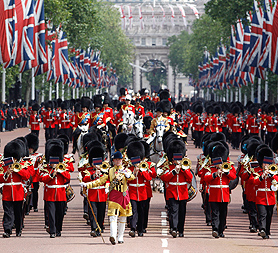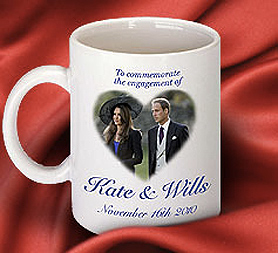Royal wedding fanfare to bolster UK economy
The fanfare of Prince William and Kate Middleton’s wedding is set to create a “bumper couple of years” for the economy alongside the Queen’s Diamond Jubilee and London 2012, Channel 4 News finds.

Wealthy Russians are expected to lead an influx of tourists from across the globe breathing life into the beleaguered industry.
Tourism numbers fell back dramatically during the recession, and continue to fall – according to figures from the Office for National Statistics.
Latest figures show that the number of visitors to the UK dropped by 3 per cent in the three months from April to June, or the second quarter of 2010. And the previous year suffered a 14 per cent fall in visitors during its lowest point between January and March 2009, the ONS said.
As a result, tourist spend on hotels and restaurants among other things fell back from a total of £25,526m in 2008, to £21,787m in 2009.
However, VisitBritain has predicted two bumper years over 2011 and 2012, with the wedding of Prince William and Kate Middleton, the Queen’s Diamond Jubilee and London 2012 Olympics creating a “halo effect” for the tourism industry.
The Royal Family generated £500m for the UK economy last year, with one in every eight of the 30m tourists that descend on the UK spending money on royal attractions.
Mark Di-Toro from Visit Britain told Channel 4 News that BRICs visitors – from the emerging economies of Brazil, Russia, India and China – are most interested in the royalty – with Russians leading the pack.
A huge 83 per cent of Russians are likely to visit royal palaces and attractions, naming Buckingham Palace as their top venue of choice.
Americans are not far behind, with 60 per cent opting for royal outings. Europeans spend the least – an average of £400 a visit – while those from the Middle East spend almost four times that, at an average of £1,500 per visit.
The forthcoming royal wedding is expected to draw a new generation of tourists to the UK, Mr Di-Toro said.
“William and Kate will open up Britain to a wider, younger, more energetic generation,” he said.
“It is the first social media royal marriage – everyone will be posting comments, photos and videos online, sharing their experiences and generating interest in the UK.”
Within moments of the announcement American TV networks led the charge to schedule prime-time special reports and despatch teams to the UK to cover the royal engagement – with CBS News even sending Erica Hill, co-anchor of The Early Show.
A CNN poll alone shows that 61 per cent of 56,166 viewers polled plan to watch the royal wedding next year. Prince Charles and Lady Diana Spencer’s wedding was celebrated by 600,000 people on the streets and watched by a global TV audience of 750 million.
Prince William and Kate Middleton's wedding: who will pay?
The wedding of Prince William and Kate Middleton could empty the Queen's reserve funds ahead of her Diamond Jubilee in 2012, Channel 4 News discovers.
Despite the eight year courtship of the couple, it would seem there is no reserve fund in place for the biggest royal event since Prince Charles married Lady Diana Spencer in 1981.
Unless parliament votes for extra money to be allocated to the couple's wedding, the cost will have to be borne by the Civil List - the Queen's household allowance - or drawn from Her Majesty's personal wealth.
Read more: Prince William and Kate Middleton's wedding: who will pay?

William Grobel, marketing director of Intangible Business, agreed that it would create a “pretty bumper couple of years”.
“It will hold the world media’s attention and it will be good for the economy. All industries will benefit – for tourism it won’t just be London – it will spread across the country, and with Kate being from Yorkshire you might find Yorkshire gets a boost.”
VisitBritain said tourism in north Wales may also see interest swell, with destinations such as Dee Valley, the market town of Llangollen and Snowdonia National Park likely to draw extra visitors.
VisitBritain’s chief executive Sandie Dawe added: “William and Kate are a modern couple. They go to nightclubs and they are outdoor people which gives us the chance to talk about these activites on offer to overseas visitors. Kate seems to shop on the high street which is very accessible. The wedding dress will give us a chance to highlight our designers while the wedding gifts will showcase our outstanding craftspeople, potters, glass and textiles. All of this helps us tell the story of contemporary Britain. It is the most wonderful publicity boost for the country.”
Verdict research group has already predicted that the wedding could bring a £620m boost the economy.
Verdict said the engagement alone could be worth £12m-18m in merchandise sales, while commemorative wedding products could pull in as much as £26m.
The retail boost from this one-day event – which is expected to be honoured with a national holiday – is set to benefit from a ‘World Cup effect’ to the tune of £360m, as shoppers stock up on treats to celebrate the occasion, Verdict said.
This could vastly outstrip the boost retailers are expected to feel from six weeks of the Olympic Games in 2012, and its legacy period afterwards.
Mr Grobel predicts that the broader retail sector will enjoy a £371m boost from London 2012.
Plus, he expects £232m to pour into the restaurant sector off the back of the Games, and bars to profit from the extra numbers to the tune of £232m.
Manufacturers of memorabilia for the forthcoming wedding, as with any royal event, would usually need to gain clearance for the use of images, royal crests and so on. In many cases – such as with the Queen’s Diamond Jubilee – these rules are relaxed.
However, a spokesman for Clarence House told Channel 4 News the rules have not yet been relaxed for the royal engagement or forthcoming wedding.
Some retailers however have gone ahead regardless – with supermarket giant Asda “pulling out all the stops” yesterday to have commemorative engagement mugs on the shelf by the end of the day at £5 each (pictured above).